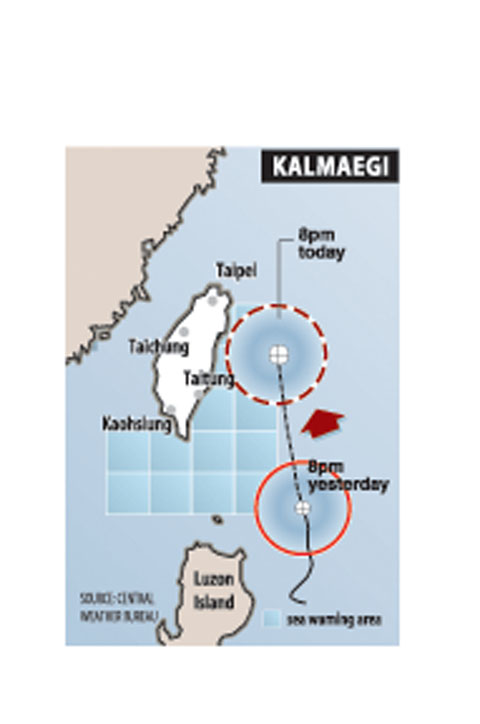The Central Weather Bureau (CWB) issued a sea alert for Tropical Storm Kalmaegi at 2:30pm yesterday as it began approaching the nation’s east coast.
The bureau was originally planning to make the announcement yesterday morning, but the storm’s rather slow and wayward movements meant the bureau decided to hold the warning until the afternoon.
Daniel Wu (吳德榮), the CWB’s weather forecast center director, said the storm had been “stuck” in the same spot for 24 hours, before it finally began moving yesterday afternoon.

As of 8:30pm yesterday, the center of the storm was located 340km southeast of Ouluanpi (鵝鑾鼻), moving north at a speed of 20kph.
Maximum wind speeds near the center of the storm were measuring approximately 120kph, while at the radius of the storm were 90kph.
Kalmaegi’s circumfluence was likely to bring heavy rain to northeastern and eastern regions starting yesterday evening, Wu said.
The bureau forecast that the storm would begin to pick up pace because of the guiding air stream of the Pacific Ocean.
It estimated that Kalmaegi would move closer to the east coast either tonight or tomorrow.
“Whether the circumfluence of the storm will make landfall requires further observations,” he said. “It is too early to know when we will issue a land alert.”
While the storm will continue to bring torrential rain to the east coast both today and tomorrow, people on the west coast should prepare for rain brought by the southwestern air stream that will arrive after the storm moves on.
While tropical storms can produce heavy storms and strong winds, they are also able to produce large ocean waves and tidal surges.
Tropical storms generally develop over large bodies of warm water.
Coastal regions can receive significant damage from a tropical storm as the storms generally do not lose their strength until they reach land.
Aside from causing damage, tropical storms can sometimes relieve drought conditions.

WAITING GAME: The US has so far only offered a ‘best rate tariff,’ which officials assume is about 15 percent, the same as Japan, a person familiar with the matter said Taiwan and the US have completed “technical consultations” regarding tariffs and a finalized rate is expected to be released soon, Executive Yuan spokeswoman Michelle Lee (李慧芝) told a news conference yesterday, as a 90-day pause on US President Donald Trump’s “reciprocal” tariffs is set to expire today. The two countries have reached a “certain degree of consensus” on issues such as tariffs, nontariff trade barriers, trade facilitation, supply chain resilience and economic security, Lee said. They also discussed opportunities for cooperation, investment and procurement, she said. A joint statement is still being negotiated and would be released once the US government has made

NEW GEAR: On top of the new Tien Kung IV air defense missiles, the military is expected to place orders for a new combat vehicle next year for delivery in 2028 Mass production of Tien Kung IV (Sky Bow IV) missiles is expected to start next year, with plans to order 122 pods, the Ministry of National Defense’s (MND) latest list of regulated military material showed. The document said that the armed forces would obtain 46 pods of the air defense missiles next year and 76 pods the year after that. The Tien Kung IV is designed to intercept cruise missiles and ballistic missiles to an altitude of 70km, compared with the 60km maximum altitude achieved by the Missile Segment Enhancement variant of PAC-3 systems. A defense source said yesterday that the number of

‘CRUDE’: The potential countermeasure is in response to South Africa renaming Taiwan’s representative offices and the insistence that it move out of Pretoria Taiwan is considering banning exports of semiconductors to South Africa after the latter unilaterally downgraded and changed the names of Taiwan’s two representative offices, the Ministry of Foreign Affairs (MOFA) said yesterday. On Monday last week, the South African Department of International Relations and Cooperation unilaterally released a statement saying that, as of April 1, the Taipei Liaison Offices in Pretoria and Cape Town had been renamed the “Taipei Commercial Office in Johannesburg” and the “Taipei Commercial Office in Cape Town.” Citing UN General Assembly Resolution 2758, it said that South Africa “recognizes the People’s Republic of China (PRC) as the sole

Taiwanese exports to the US are to be subject to a 20 percent tariff starting on Thursday next week, according to an executive order signed by US President Donald Trump yesterday. The 20 percent levy was the same as the tariffs imposed on Vietnam, Sri Lanka and Bangladesh by Trump. It was higher than the tariffs imposed on Japan, South Korea and the EU (15 percent), as well as those on the Philippines (19 percent). A Taiwan official with knowledge of the matter said it is a "phased" tariff rate, and negotiations would continue. "Once negotiations conclude, Taiwan will obtain a better